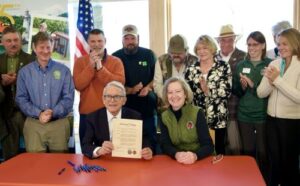Ohio NRCS Announces New EQIP Application Deadline of Jan. 15, 2020


Ohio NRCS Announces New EQIP Application Deadline of Jan. 15, 2020
POMEROY, Ohio – Local agricultural producers have until Friday, Jan. 15 to submit applications for Ohio’s Environmental Quality Incentives Program (EQIP) to implement conservation practices on their land.
This year, Meigs County farmers or ranchers can apply for the general EQIP program or for assistance under two special EQIP projects: Pasture Improvement and Oak Management.
Administered by the U.S. Department of Agriculture’s Natural Resources Conservation Service, EQIP is a voluntary conservation program which helps producers make conservation work for them. NRCS provides agricultural producers with financial resources and one-on-one help to plan and implement improvements, or what NRCS calls conservation practices. Using these practices can lead to cleaner water and air, healthier soil and better wildlife habitat, all while improving agricultural operations.
Through EQIP, you can voluntarily implement conservation practices, and NRCS co-invests in these practices with you. Together, NRCS and producers invest in solutions that conserve natural resources for the future while also improving agricultural operations, said Carrie Crislip, NRCS district conservationist for Meigs and Jackson counties.
Over the past three fiscal years, nearly 50 Meigs County producers have received $291,000 in EQIP funding in the form of cost-share payments.
Financial assistance is now available in a variety of agricultural categories such as cropland, pasture operations, and organic. Several special projects are also available which address water quality, forestry management, improving pollinator populations and wildlife habitat, pasture improvements and many more.
In addition to the regular EQIP signup, the Pasture Improvement Special Project funding is being offered to producers in 10 southern Ohio counties including Meigs County.
Pastures are a predominant agricultural land use in Ohio’s hilly Appalachian region but pose specific conservation-related issues, Crislip said. Grazing livestock can cause erosion problems in pastures, especially when the ground is wet and when the animals are contained near the farmstead in colder weather.
The Pasture Improvement Project will help farmers install conservation practices and manage their pastures in a way that improves the quality of the pasture and the health of grazing livestock, while also protecting natural resources. The conservation practices available through this project include access roads, watering facilities, livestock pipeline, fencing, heavy use area protection, stream crossings, and spring development.
The second special project, the Oak Management Special Project is geared towards helping forest landowners interested in restoring their forests. NRCS uses EQIP to restore privately owned oak-hickory woodlands by providing financial resources and one-on-one help to plan and implement improvements.
Woodland owners in owners in Meigs County can receive both technical assistance from professional foresters and financial assistance to implement conservation practices recommended by foresters using EQIP. Commonly used practices include grapevine control, control of invasive species, and tree plantings.
To participate in USDA conservation programs, applicants should be farmers, or farm or forest landowners and meet eligibility criteria. For more information, contact District Conservationist, Carrie Crislip at 740-992-6646 extension 103 or by email at [email protected] as soon as possible. The
For offices with restrictions on in-person appointments due to COVID-19s, services are still available by phone, email, and through other digital tools. The Meigs County USDA-NRCS/Meigs Soil and Water Conservation District Service Center is located at 113 E. Memorial Drive, Suite D, in Pomeroy. The office status is available at https://www.farmers.gov/coronavirus/service-center-status.
Applications signed and submitted to NRCS by the Jan. 15 deadline will be evaluated for fiscal year 2021 funding. Visit Ohio NRCS website under “EQIP Funding Categories” for more details. To learn more about EQIP or other technical and financial assistance available through NRCS conservation programs, visit Get Started with NRCS or contact your local USDA Service Center.









